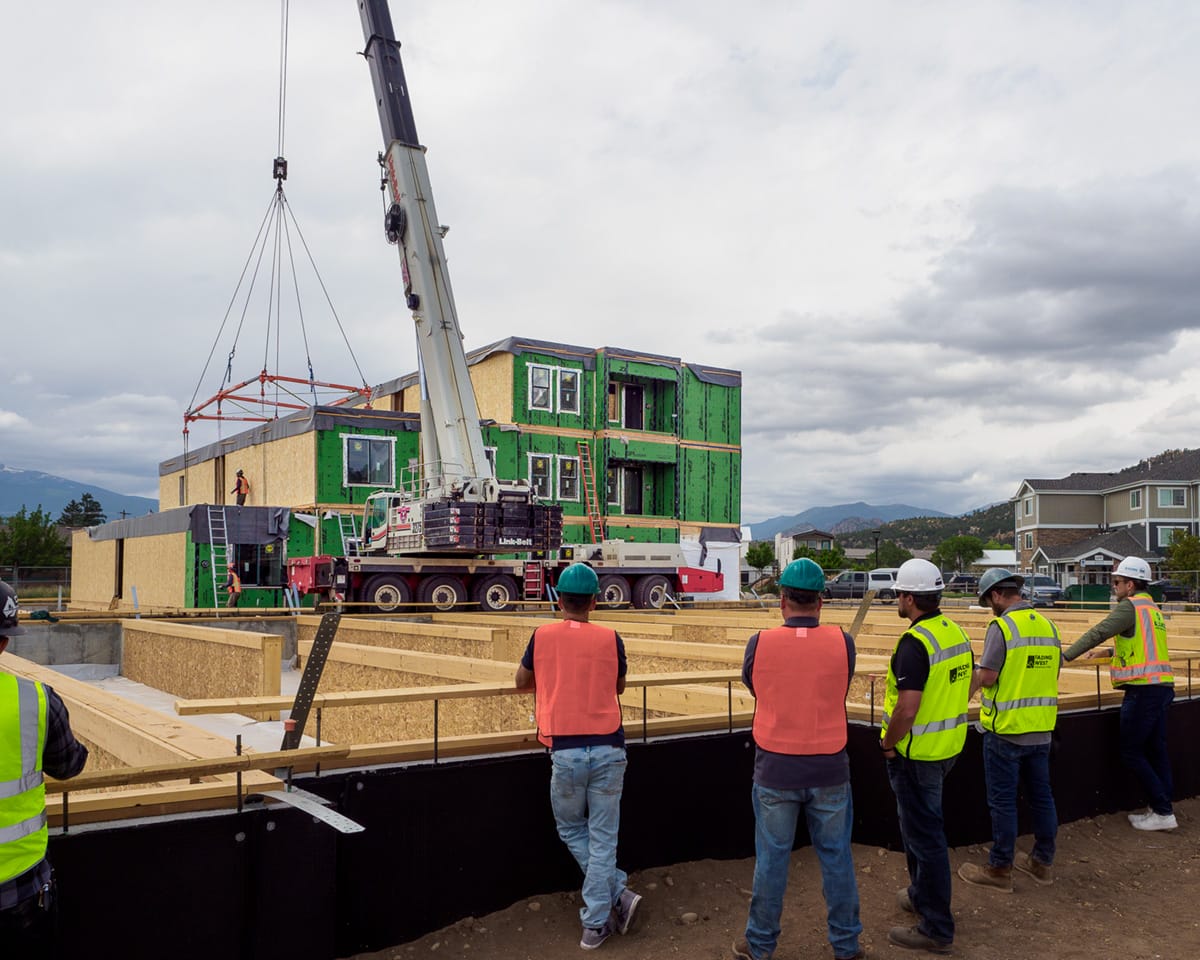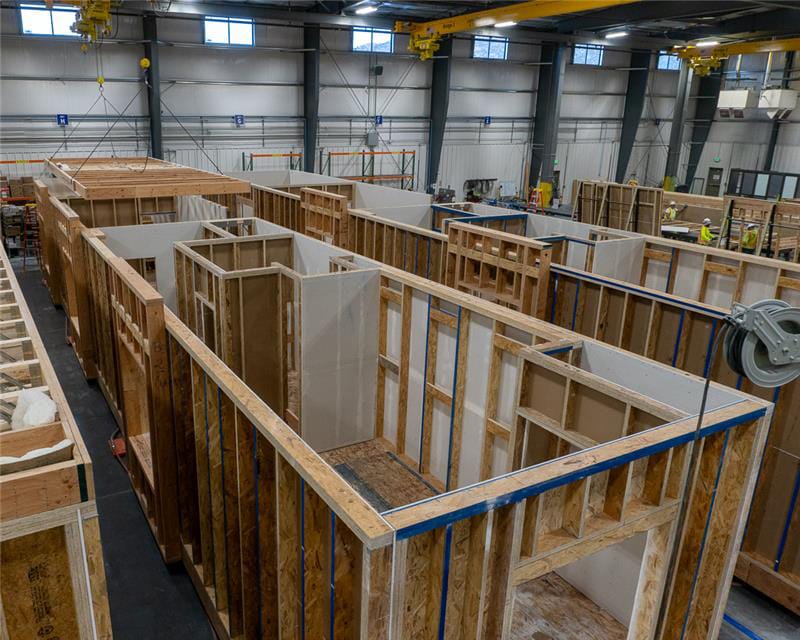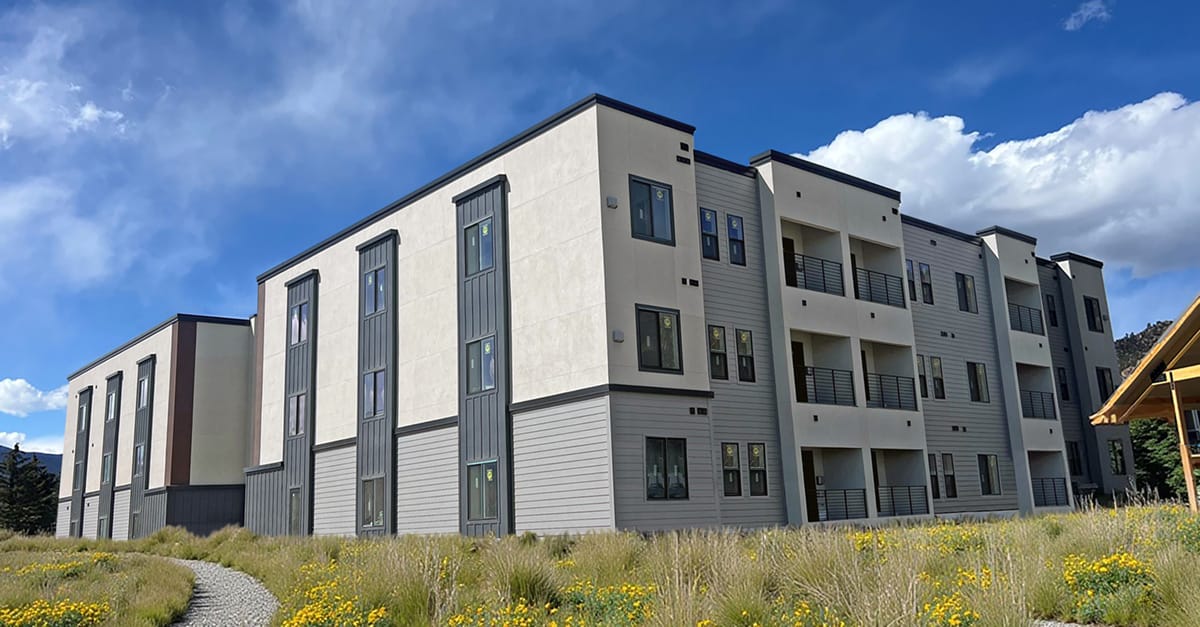Midland Apartments
A Model for Public-Private Modular Housing in Buena Vista
The project’s innovative approach earned it a spotlight at the 2025 World of Modular conference. There, the Midland Apartments were featured as a leading case study in workforce housing through modular construction.
The presentation focused on:
- Public-private financing strategies
- Modular construction efficiencies
- Small-town implementation challenges and solutions
The Midland Apartments in Buena Vista, Colorado, are a standout example of how innovative thinking and collaboration can solve housing challenges. This workforce housing project combined public land, private investment, and modular construction to create
a development that’s affordable, efficient, and community-focused.
Public-Private Collaboration in Action
The Town of Buena Vista worked closely with private developers to bring this project to life. Through this public-private partnership, the town provided land and local incentives, while the private side delivered financing, construction, and project management.
This collaboration balanced public goals with private execution, helping to deliver housing faster and with greater cost control. It’s a model that other small communities facing housing shortages can learn from and replicate.

The Midland Apartments building 1 during set week.
Built with Fading West Modular Construction
A key to the project’s success was its use of offsite modular construction. The apartments were built using Fading West modules, manufactured just minutes from downtown Buena Vista. These modules were trucked to the site and installed quickly, reducing construction time and minimizing neighborhood disruption.
Modular construction also improved quality control and allowed for simultaneous site and building work — accelerating the entire process.
Designed by EVstudio
Architecture and Engineering firm EVstudio led the design effort with seamlessly integrated Architecture, Structural Engineering, and MEP Engineering services for the project. Their team focused on creating a community-forward development that fits seamlessly into the fabric of downtown Buena Vista.
The Midland Apartments feature efficient floor plans, thoughtful site layout, and a logical and efficient style. This intentional design helps support affordability and aligns with the town’s long-term planning goals.

The Midland Apartments modules in the factory during fabrication.
A Blueprint for Other Communities
The Midland Apartments prove what’s possible when communities think creatively about housing. By blending public land use, private development, and modular building technology, Buena Vista delivered much-needed housing without compromising on quality or design.
As more towns face similar pressures, this project offers a replicable, scalable solution that delivers real results — faster and smarter.
More from Modular Advantage
AoRa Development Aims for New York’s First Triple Net Zero Building Using Modular Methods
More cities are providing funding for newer infrastructure projects as long as they meet sustainability requirements. This is how modular can fit the bill, thanks to its lower waste production.
Developers and Designers: Lessons Learned with Modular Design
Modular construction is attractive to many developers because sitework and module construction can occur simultaneously, shortening the schedule and reducing additional costs.
UTILE: Putting Modular Building on a Fast Track
In Quebec, UTILE is taking the lead in creating affordable modular buildings to help decrease the student housing shortage. During the process, the company discovered what it takes to make the transition to modular building a success.
Sobha Modular Teaches Developers How to Think Like Manufacturers
With its 2.7 million square foot factory in UAE, Sobha Modular is bringing both its high-end bathroom pods to high-end residences to Dubai while developing modular projects for the U.S. and Australia.
RoadMasters: Why Early Transport Planning is Make-or-Break in Modular Construction
In modular construction, transportation is often called the “missing link.” While it rarely stops a project outright, poor planning can trigger costly delays, rerouting, and budget overruns.
Navigating Risk in Commercial Real Estate and Modular Construction: Insights from a 44-Year Industry Veteran
Modular projects involve manufacturing, transportation, and on-site assembly. Developers must understand exactly what they are responsible for versus what they subcontract. Risk advisors should research the developer’s contractors, subcontractors, and design-build consultants—especially the modular manufacturer.
Art²Park – A Creative Application of Modular and Conventional Construction
Art²Park is more than a park building—it’s a demonstration of what modular construction can achieve when thoughtfully integrated with traditional materials. The use of shipping containers provided not only speed and sustainability benefits but also a powerful structural core that simplified and strengthened the rest of the building.
Building Smarter: A New Standard in Modular Construction Efficiency
Rising material prices, labour shortages, expensive financing and tightening environmental rules have made conventional construction slower, costlier, and more unpredictable. To keep projects on schedule and within budget, builders are increasingly turning to smarter industrialized methods.
Resia: Breaking All the Rules
Resia Manufacturing, a division of U.S.-based Resia, is now offering prefabricated bathroom and kitchen components to industry partners. Its hybrid fabrication facility produces more precise bathroom and kitchen components (modules) faster and at lower cost than traditional construction. Here’s how Resia Manufacturing does it.
How LINQ Modular Innovates to Bring Modular To The Market in the UAE and Beyond
LINQ Modular, with an office and three manufacturing facilities in Dubai, is a modular firm based in United Arab Emirates. The company is on a mission: to break open the housing and construction markets in the Gulf Cooperation Council (GCC) area with modular.












